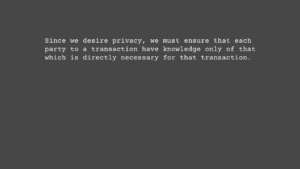During a U.S. congressional hearing on decentralised finance (DeFi), the chief legal and policy officer for Polygon Labs boasted about being able to freeze user funds via public-private partnerships and blockchain analytics tools.
The Polygon executive, Rebecca Rettig, noted that ‘through public-private partnerships we’re actually able to trace wallets much more quickly than the decades it’s taken to trace illicit funds in the traditional financial world‘.
Polygon executive bragging to Congress about how good they are at tracking down “criminals” and freezing people’s funds.
Time to face it. DeFi is just TradFi with new middlemen.
pic.twitter.com/S4sxYqDrtp— CS Bastiat ⚖️ (@CSBastiat) September 12, 2024
The back and forth discussion demonstrated that at least certain elements of the DeFi space are more concerned about paying lip service to decentralisation and user privacy than actually implementing it.
Taken aback by the congressman’s line of questioning, which does not represent the interests of average Americans, one X user highlighted the absurd nature of the hearing as he alluded to basic privacy rights.
it’s CRAZY how the premise of this line of questioning is that the US federal government ought to have the ability to monitor and control every financial transaction worldwide
and the entire discussion continues as if that premise is unquestionable and mandatory
— Jangle (@deFi_Jangle) September 12, 2024
The disconnect between the pretext for blanket surveillance measures and the resulting public-private inner-circle that emerges is jarring to say the least.
In fact, despite traditional finance having implemented KYC and AML standards in recent years, this has failed to mitigate so-called illicit finance, which mainly passes through the most heavily regulated banks and financial institutions, per Forbes.
In 2020, a United Nations report estimated that major U.S. banks facilitate around $2 trillion in suspicious or illegal activity each year. According to investigations at the time, even after fines and prosecution, “well-known JPMorgan Chase, HSBC, Standard Chartered, Deutsche Bank, and Bank of New York Mellon are all involved in moving funds for suspected criminals”, per Forbes.
In this context, such regulations and hearings appear to be representing a self-serving echelon of would-be untouchables instead of DeFi or crypto users.
While a handful of decentralised blockchains such as Litecoin release updates that bolster virtual private money for normal users, Polygon Labs appears to have a vested interest in replicating the lucrative TradFi status quo in DeFi.
Buy, trade and exchange Litecoin on reviewed exchanges here.
Disclaimer: the content on this site should not be considered as investment advice. Investing is speculative. Your capital is your responsibility.


